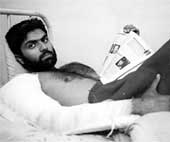The ISI: "The Invisible Government"
As the London Times has put it, Saeed Sheikh
"is no ordinary terrorist but a man who has connections that reach high
into Pakistan's military and intelligence elite and into the innermost
circles of Osama Bin Laden and the al-Qaeda organization." [London
Times, 4/21/02] To understand why Saeed is so important in understanding
9/11, it is necessary to first understand the Pakistan's intelligence agency,
the Inter-Services Intelligence (ISI). The ISI plays a much more significant
role in the Pakistani government than do its counterparts in other countries.
Time Magazine has noted, "Even by the shadowy standards of spy agencies,
the ISI is notorious. It is commonly branded 'a state within the state,'
or Pakistan's 'invisible government.'" [Time,
5/6/02] The ISI grew into its present form during the war between the
Soviet Union and mujaheddin guerrillas in Afghanistan in the 1980s. The
CIA thought the Afghan war could be Russia's own costly Vietnam War, and
they funneled billions to the mujaheddin resistance to keep them a thorn
in Russia's side. The strategy worked: Soviet soldiers withdrew from Afghanistan
in 1989, and the Soviet Union collapsed two years later, partly due to
the costs of the war. [Pittsburgh
Post-Gazette, 9/23/01]
But the costs to keep the mujaheddin fighting
were staggering, with estimates ranging between $6 billion and $40 billion.
[New York Times, 8/24/98, Nation,
2/15/99] While a substantial portion of this amount came from the CIA
and the Saudi Arabian government, who were both funneling the money through
the ISI, much of the cost was deferred by Afghanistan's opium trade. The
Sydney Morning Herald notes, "Opium cultivation and heroin production in
Pakistan's northern tribal belt and adjoining Afghanistan were a vital
offshoot of the ISI-CIA cooperation. It succeeded in turning some of the
Soviet troops into addicts. Heroin sales in Europe and the US, carried
out through an elaborate web of deception, transport networks, couriers
and payoffs, offset the cost of the decade-long war in Afghanistan." [Sydney
Morning Herald, 9/27/01] Afghan opium production ballooned from 250
tons in 1982 at the start of the war to 2,000 tons in 1991 just after its
end. The Minneapolis Star Tribune observed, "If their local allies were
involved in narcotics trafficking" - the ISI and their allies in Afghanistan
- "it didn't trouble CIA." [Star
Tribune, 9/30/01]
Although the Afghan war has ended, the ISI has
continued to profit from opium. In 1999, the United Nations Drug Control
Programme estimated that the ISI was making around $2.5 billion annually
from the sale of illegal drugs. [Times
of India, 11/29/99] The drug trade helped unite the ISI and Osama bin
Laden, who was said to have taken a 15% cut of the Afghan drug trade money
in exchange for protecting smugglers and laundering their profits. [Star
Tribune, 9/30/01]
By 1994, the Taliban, a group of Muslim radicals
studying in Pakistan, began conquering Afghanistan. The Taliban had been
recruited by the ISI and molded into a fanatical force that conquered Afghanistan's
capital by 1996. CNN reported, "The Taliban are widely alleged to be the
creation of Pakistan's military intelligence [the ISI]. Experts say that
explains the Taliban's swift military successes." [CNN,
10/5/96] This support continued. For instance, in early 2001, a leading
US expert on South Asia claimed that the Taliban were still "on the payroll
of the ISI." [Times
of India, 3/7/01] The ISI didn't create the Taliban simply for strategic
reasons; they shared the Taliban's extreme radical vision. As the Wall
Street Journal remarked in November 2001, "Despite their clean chins and
pressed uniforms, the ISI men are as deeply fundamentalist as any bearded
fanatic; the ISI created the Taliban as their own instrument and still
supports it." [Asia
Times, 11/15/01]
Saeed's Background
Saeed Sheikh would eventually become deeply involved
in the world of the ISI, as well as al-Qaeda. But initially he seemed an
unlikely candidate for a career in espionage and terrorism. He was born
in Britain with the name Ahmed Omar Saeed Sheikh, the son of a wealthy
Pakistani clothing manufacturer. He grew up in London, a brilliant student
attending the best private schools. He studied mathematics and statistics
at the London School of Economics. While still at school, he started a
successful shares and equities business and also was a chess champion,
world class arm wrestler, and martial arts expert - a rare combination
of physical and mental prowess. [Rediff,
2/6/02, South
Asian Outlook, 3/02]
| His life took a turn when he volunteered for
charity work in Bosnia in late 1992. The Bosnian war was raging, and he
saw atrocities committed by Serbians on Bosnian Muslims. He returned to
Britain a committed Muslim radical. Because of his impressive abilities
in economics and mathematics, as well as fluency in English and complete
understanding of Western society, he was a very valuable asset to any terrorist
group. [ABC
News, 2/7/02]
In 1993 he emerged in Pakistan as a member of
a militant group fighting for the liberation of Kashmir from India. Pakistan
has been fighting India for years over control of Kashmir, and it appears
Saeed was put on the ISI payroll around this time, to help the Pakistani
cause in Kashmir. [ABC
News, 2/7/02] In 1994, Saeed began training at a training camp in Afghanistan.
He soon was teaching the classes. [Los
Angeles Times, 2/9/02] He developed close ties with al-Qaeda while
training there. By the end of the year he was known as Osama bin Ladenís
"favored son" or "my special son." [London
Times, 8/21/02, Vanity Fair,
8/02] |
~ ~ ~
In hospital shortly after
his arrest in 1994
|
|